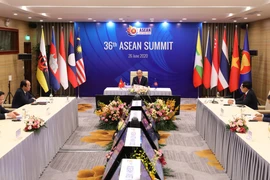 Volunteers taking on fires at Garung village in Pulang Pisau district, Central Kalimantan, Indonesia. (Credit: Indonesian Ministry of Environment and Forestry)
Volunteers taking on fires at Garung village in Pulang Pisau district, Central Kalimantan, Indonesia. (Credit: Indonesian Ministry of Environment and Forestry)Jakarta (VNA) - The ASEANSecretariat has hosted an online conference to strengthen efforts,coordination and preparation for tackling transboundary haze pollution, which is predicted to peakin August and September.
The event, funded by the International Fund for Agricultural Development (IFAD)'s MeasurableAction for Haze-Free Sustainable Land Management in Southeast Asia (MAHFSA)Programme, brought together representatives from hazemanagement agencies and relevant bodies of ASEAN, as well as partners and privateorganisations.
In his speech, Deputy Secretary-General of ASEAN for ASEAN Socio-CulturalCommunity (ASCC)Kung Phoak highlighted the potentialthreats and impacts of COVID-19 on forest fire and haze prevention and response due to resourceconstraints and limited mobility on intervention.
He called for strengthened cooperation between relevant agencies of ASEAN andthe bloc’s partners, as well as preparedness andcoordination for a concerted response of authorities, communities and privatesector in the possible event of fire and transboundary haze pollution.
For his part, IFAD Country Director for South East Asia and the Pacific Sub-regional Office Cossio Cortez said IFAD has beensupporting ASEAN in the implementation of the haze-free agenda for over adecade.
He further stressed that in thepost-pandemic period, and in view of the upcoming dry season, ASEAN mustcontinue join efforts to strengthen regional coordination aiming atpromoting sustainable management of natural resources and protecting the healthof people in the region.
During the seminar, representativesof ASEAN and Australia shared insights into the impacts and potential risks ofthe pandemic situation on ASEAN’s response to fire and haze events, as well aslessons learnt from the 2020 dry season in the Mekong River region and the bushfirecrisis in Australia last year.
Participants emphasised the importance of cross-sectoral coordination byprioritising regional measures focused on strategies to implement healthpriorities, including regional prevention and control of new emerging infectious diseases such as COVID-19.
The event reaffirmed ASEAN’s efforts to secure ahaze-free region as guided by the Roadmap in the ASEAN Agreement onTransboundary Haze Pollution framework; increase awareness of and preparedness for responding transboundary haze events within and across sectors and disciplines; and deal with the impact of the COVID-19 pandemic on fire and haze management, and thepotential risk of post-pandemic pressure on peatland ecosystems./.
He further stressed that in thepost-pandemic period, and in view of the upcoming dry season, ASEAN mustcontinue join efforts to strengthen regional coordination aiming atpromoting sustainable management of natural resources and protecting the healthof people in the region.
During the seminar, representativesof ASEAN and Australia shared insights into the impacts and potential risks ofthe pandemic situation on ASEAN’s response to fire and haze events, as well aslessons learnt from the 2020 dry season in the Mekong River region and the bushfirecrisis in Australia last year.
Participants emphasised the importance of cross-sectoral coordination byprioritising regional measures focused on strategies to implement healthpriorities, including regional prevention and control of new emerging infectious diseases such as COVID-19.
The event reaffirmed ASEAN’s efforts to secure ahaze-free region as guided by the Roadmap in the ASEAN Agreement onTransboundary Haze Pollution framework; increase awareness of and preparedness for responding transboundary haze events within and across sectors and disciplines; and deal with the impact of the COVID-19 pandemic on fire and haze management, and thepotential risk of post-pandemic pressure on peatland ecosystems./.
VNA




























